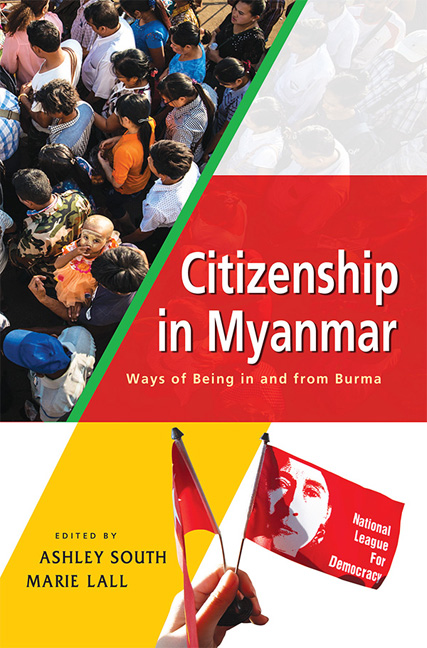Book contents
- Frontmatter
- Dedication
- Contents
- Foreword
- The Contributors
- Map of Myanmar
- Introduction
- 1 Ethnic Politics and Citizenship in History
- 2 Representation and Citizenship in the Future Integration of Ethnic Armed Actors in Myanmar/Burma
- Special Contribution: The Way Forward for Peace, Stability and Progress in Burma/Myanmar
- 3 National Political Dialogue and Practices of Citizenship in Myanmar
- 4 Citizenship and Minority Rights: The Role of “National Race Affairs” Ministers in Myanmar's 2008 Constitution
- Special Contribution: Karenni People at a Glance
- 5 Myanmar's Youth and the Question of Citizenship
- Special Contribution: I Am a Citizen of Myanmar
- 6 “The Value of Life”: Citizenship, Entitlement and Moral Legibility in Provincial Myanmar
- Special Contribution: How I Became Shan
- 7 Conflict and Mass Violence in Arakan (Rakine State): The 1942 Events and Political Identity Formation
- 8 Exploring the Issue of Citizenship in Rakhine State
- Special Contribution: Rohingya and Nationality Status in Myanmar
- 9 Myanmar's Other Muslims: The Case of the Kaman
- Special Contribution: Interview with P'doh Kweh Htoo Win
- Index
4 - Citizenship and Minority Rights: The Role of “National Race Affairs” Ministers in Myanmar's 2008 Constitution
Published online by Cambridge University Press: 28 June 2018
- Frontmatter
- Dedication
- Contents
- Foreword
- The Contributors
- Map of Myanmar
- Introduction
- 1 Ethnic Politics and Citizenship in History
- 2 Representation and Citizenship in the Future Integration of Ethnic Armed Actors in Myanmar/Burma
- Special Contribution: The Way Forward for Peace, Stability and Progress in Burma/Myanmar
- 3 National Political Dialogue and Practices of Citizenship in Myanmar
- 4 Citizenship and Minority Rights: The Role of “National Race Affairs” Ministers in Myanmar's 2008 Constitution
- Special Contribution: Karenni People at a Glance
- 5 Myanmar's Youth and the Question of Citizenship
- Special Contribution: I Am a Citizen of Myanmar
- 6 “The Value of Life”: Citizenship, Entitlement and Moral Legibility in Provincial Myanmar
- Special Contribution: How I Became Shan
- 7 Conflict and Mass Violence in Arakan (Rakine State): The 1942 Events and Political Identity Formation
- 8 Exploring the Issue of Citizenship in Rakhine State
- Special Contribution: Rohingya and Nationality Status in Myanmar
- 9 Myanmar's Other Muslims: The Case of the Kaman
- Special Contribution: Interview with P'doh Kweh Htoo Win
- Index
Summary
INTRODUCTION
In Myanmar, “national races” settled in the territory of Myanmar since 1823 and their descendants are automatically eligible for the first type of citizenship (see introduction by Lall and South). There are currently 136 such groups that are officially recognized as “native” or national races (one group was added at the end of U Thein Sein government). However, not many of them share the vision and values of a Burman/Buddhist “national identity” forged upon them by the state dominated by Burman elites. Successive military governments have dealt with minority nationalities’ grievances and aspiration for self-determination and federalism by crushing forces that refused to acknowledge the legitimacy of militarized and centralized state. Creating a shared identity among these nationalities has been a major challenge for post-independence Myanmar government which saw federalism as synonymous with separatism and a path leading to the disintegration of the union. Armed groups and leaders of ethnic communities on the other hand saw federalism as the best solution to be a part and citizens of the Union of Myanmar.
The 2008 Constitution attempted to deal with these grievances by offering some limited provisions for national minorities. First, the existing seven regions and seven states (which are named after seven dominant minority groups) are given limited legislative and administrative powers. Second, autonomous zones/regions are given ethnic nationalities that constitute a majority in two adjacent townships. Six such groups, Wa, Pao, Palaung, Danu, Kokang in Shan State and Naga from Sagaing are qualified for this. Thirdly, the minority that constitutes 0.1 per cent of the populations of the country's total population and reside in any given region/state are to be represented by their respective “national race affair” ministers. There were twenty-nine such positions. Studies have examined the role and performances of regional governments and the selfautonomous zones (SAZs) under U Thein Sein government. However, there have not been any studies that examine the role and implications of ethnic affairs ministers in Myanmar. To what extent these ethnic affairs ministers (referred to as “national race affairs” ministers) are able to represent their members’ interests? How much power and authority do they have? Were they able to forge a common identity of multi-ethnic states while promoting their cultures and identity and addressing grievances of their respective constituents?
- Type
- Chapter
- Information
- Citizenship in MyanmarWays of Being in and from Burma, pp. 113 - 139Publisher: ISEAS–Yusof Ishak InstitutePrint publication year: 2017



